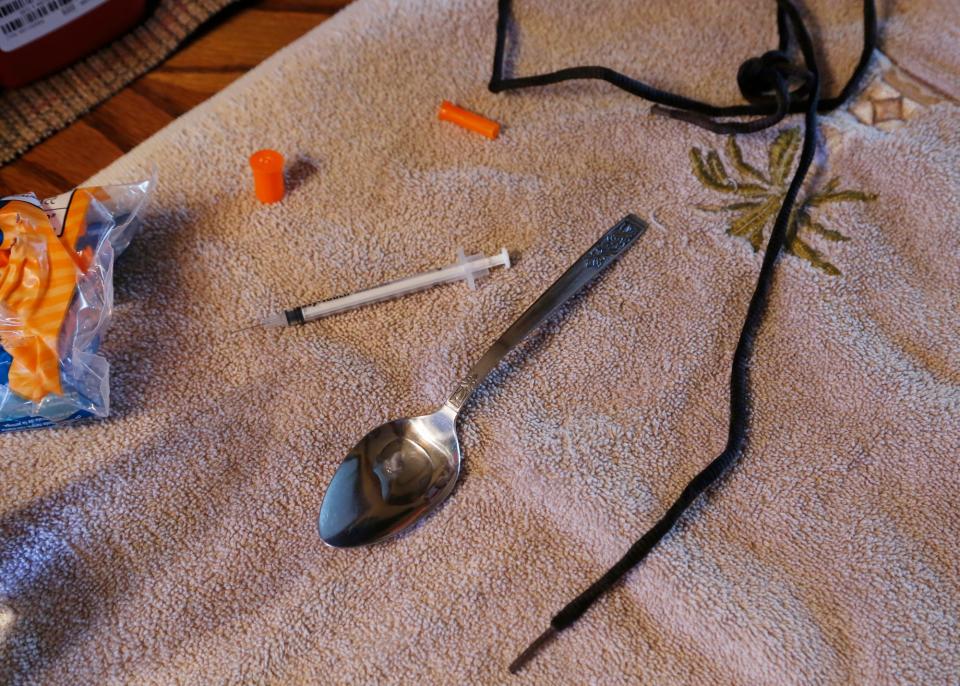Rescue Biomedical receives $2.82M grant to develop opioid overdose detection
- Oops!Something went wrong.Please try again later.
WEST LAFAYETTE, Ind. − Rescue Biomedical, an opioid overdose treatment company in connection with Purdue, recently received a $2.82 million grant that will be provided over four years.
Specifically, Rescue Biomedical has received a Fast-Track Small Business Innovation Research Grant from the National Institutes of Health. This grant will go towards developing the company's technology that detects an opioid overdose in a person and delivers naloxone to reverse the reaction.

Purdue's connection
Hyowon Lee is Rescue Biomedical's CEO as well as an associate professor from the Weldon School of Biomedical Engineering, the director of the Center for Implantable Devices at Purdue and the Purdue Faculty Champion in Mental Health and Substance Misuse.
"Our device is a closed-loop drug delivery system that automatically detects when someone is overdosing and immediately provides life-saving naloxone to prevent long-term neurological damage or death,” Lee said in a release.
Other Rescue Biomedical team members hail from Purdue, including Craig Goergen, the Leslie A. Geddes Associate Professor of Biomedical Engineering; Chi Hwan Lee, the Leslie A. Geddes Associate Professor of Biomedical Engineering and associate professor of mechanical engineering; and Jacqueline Linnes, the Marta E. Gross Associate Professor of Biomedical Engineering.
Resources for those in need:Thousands of Hoosiers die each year from opioid overdose; where to turn for help
A former student of Hugh Lee's, Vy Le, is also involved in the company while also pursuing further education at Rice University.
$2.82 million grant
The four-year, $2.82 million grant is an "expedited award." According to a release, this grant, "requires administrative approval at the end of what would be a traditional Phase I period to continue to Phase II with no required additional scientific review."
According to Lee, this grant will provide the chance to succeed in scientific milestones throughout the entire lifetime of the grant.
"In Phase I, our goal is to better understand customer needs and identify a regulatory pathway for an approval from the U.S. Food and Drug Administration,” Lee said. “In Phase II, we aim to perform more usability evaluations and demonstrate functionality as we move toward regulatory approval.
After the successful conclusion of these milestones, we will need to raise additional funds to scale up our manufacturing and to go through clinical trials to obtain regulatory approval.”
SBIR grants
SBIR along with Small Business Technology Transfer (STTR) grants are provided to small domestic business in order to encourage them to further work on federal research and development, with the potential for commercialization, according to SBIR.gov.
"(The grants) provide us with a substantial, non-dilutive launchpad to further develop our ideas to bring to the market,” Lee said. “It gives us more visibility and credibility to other potential investors and stakeholders since we have gone through the rigors of federal review panels. We are trying to work on solving real-life problems that affect hundreds of thousands of people across the country, and the SBIR program from the NIH is enabling it.”
Overdose rates in the United States
The Centers for Disease Control and Prevention reported 91,799 overdose deaths in 2020 across the nation. This is a markup of 31% since 2019.
“The development of the Rescue Biomedical technology is really exciting and comes at a critical time,” Allyson Dir, assistance professor in Psychiatry at IU School of Medicine, said in the release. “Harm reduction is meant to save lives, and this potential technology will be a great addition to that toolkit of strategies and interventions. The more resources that are available, the more opportunities there are to improve outcomes and save lives.”
This article originally appeared on Lafayette Journal & Courier: Opioid overdose treatment company, Rescue Biomedical, awarded grant

